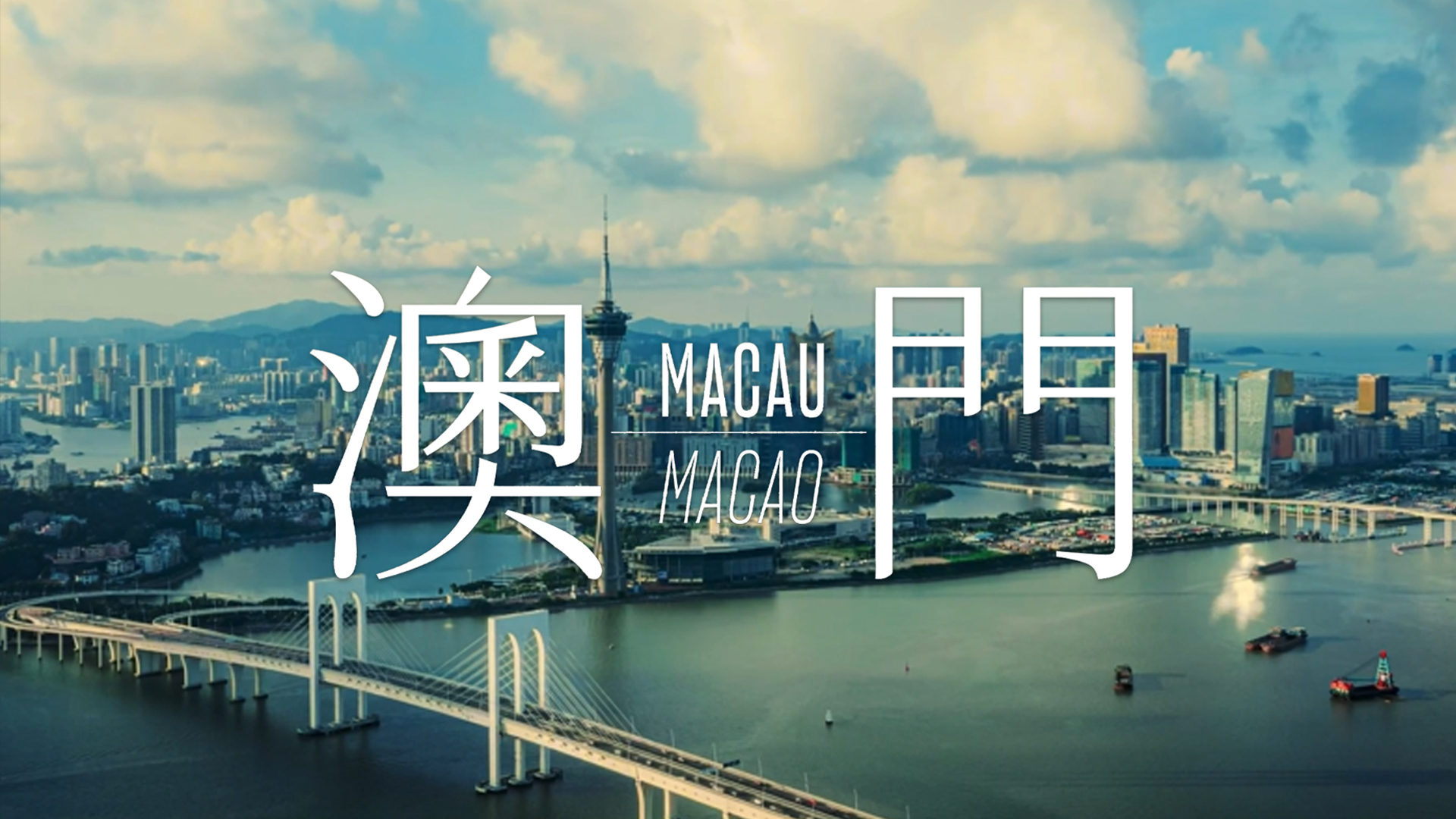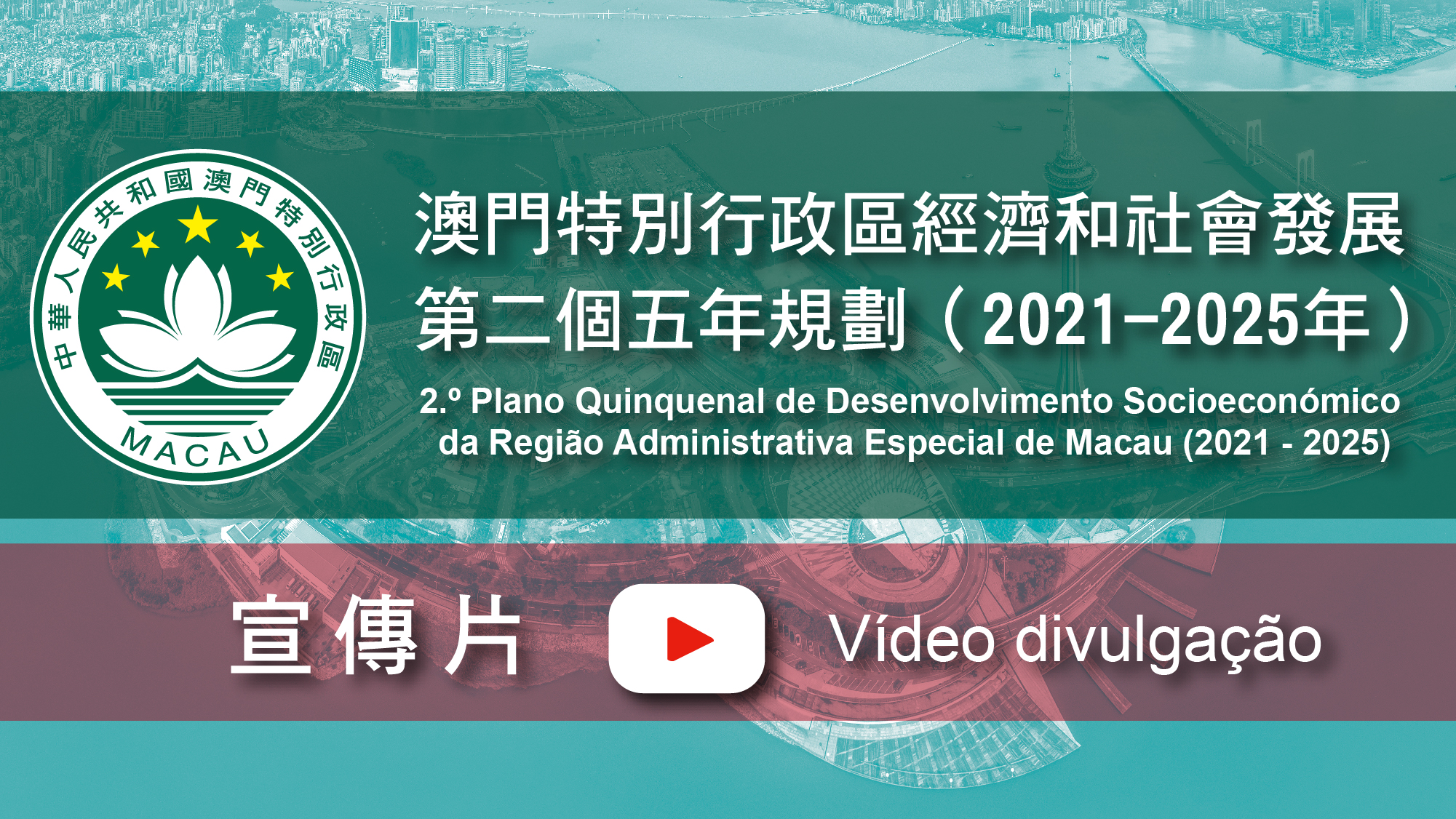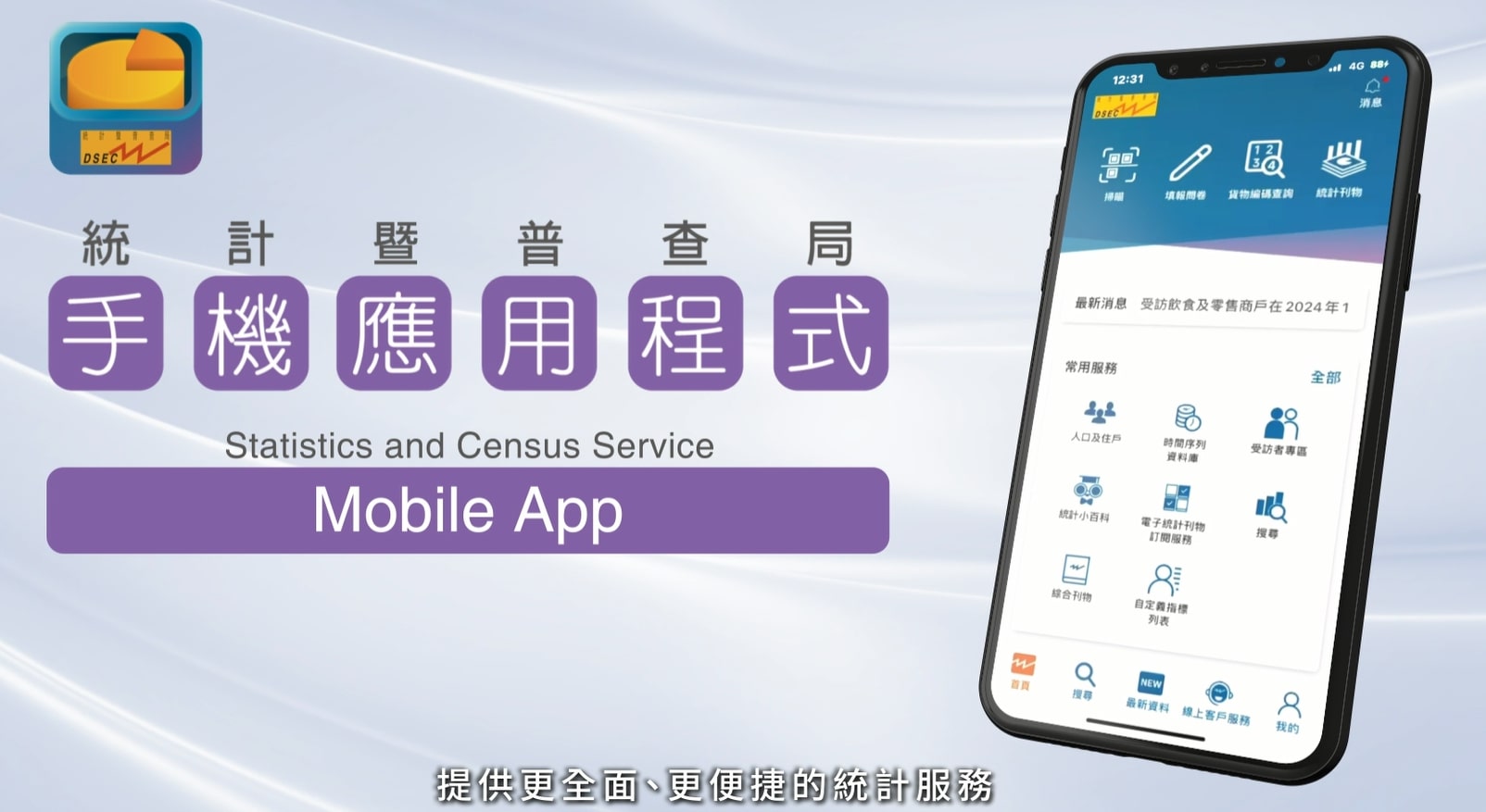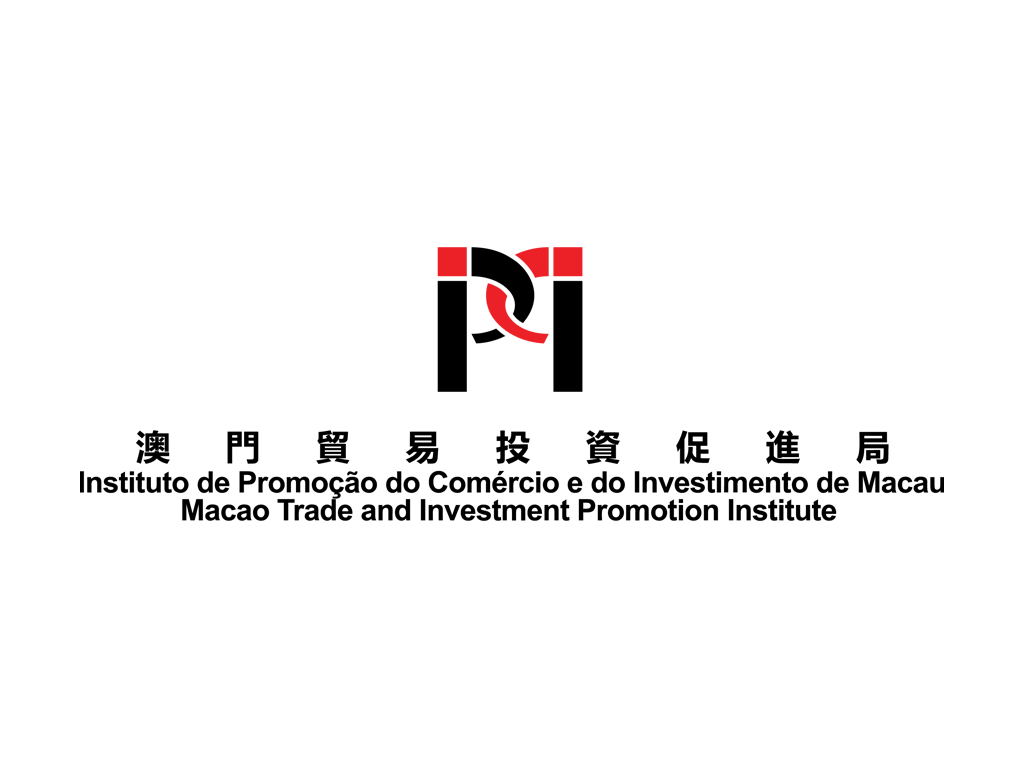Search Issues
THE CENTRAL GOVERNMENT ANNOUNCED A SERIES OF NEW MEASURES AIMED AT INCREASING CO-OPERATION BETWEEN CHINA AND PORTUGUESE-SPEAKING COUNTRIES, AS THE 5TH MINISTERIAL CONFERENCE OF FORUM FOR ECONOMIC AND TRADE CO-OPERATION BETWEEN CHINA AND PORTUGUESE-SPEAKING COUNTRIES (MACAO) UNDERPINS MACAO’S ROLE AS A PLATFORM.
The 5th Ministerial Conference of Forum Macao took place in Macao on 11 and 12 October 2016. During the Conference, Premier Li Keqiang announced a series of new measures aimed at increasing co-operation between China and Portuguesespeaking Countries.
One of the highlights of the new measures is the enhancement of co-operation in the field of production capacity, with the Mainland China offering special loans of RMB2 billion (MOP2.36 billion) to Portuguese-speaking Countries in Africa and Asia.
Companies will be encouraged to build or reinvigorate economic and trade co-operation zones in Portuguese-speaking Countries, and explore jointly with those countries business opportunities in other markets.
In the field of co-operation in development, Mainland China will offer a grant of RMB2 billion to Portuguese-speaking Countries in Africa and Asia to support projects intended to raise living standards by improving areas such as agriculture, trade and investment facilitation, the prevention and treatment of malaria, and research into traditional medicines.
Mainland China would waive RMB500 million of overdue repayments of interest-free loans to Portuguese-speaking Countries in Africa and Asia.
Mainland China expressed its commitment to the newly established China-Portuguese-speaking Countries Federation of Entrepreneurs (see next article).
Exchanges and co-operation in the field of health will be increased. Mainland China will support collaboration among hospitals and the development of women and child health care programmes, and short-term free clinic service, as well as continue to send medical teams, comprising 200 individuals, to Portuguese-speaking Countries in Africa and Asia.
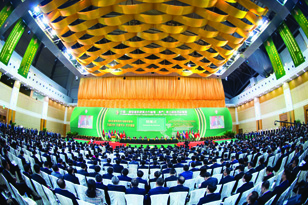
Training and education
Premier Li announced that China would provide training in a number of fields to 2,000 people in Portuguesespeaking Countries, and award 2,500 scholarships a year. He said Mainland China would continue to support the reinvigoration of educational institutions in Portuguesespeaking Countries and seek to establish in those countries platforms for cultural exchanges with Mainland China.
The package includes also maritime co-operation measures. Premier Li said Mainland China would support Portuguese-speaking Countries in Africa and Asia by building facilities to prevent maritime mishaps and to deal with the challenges posed by climate change. Mainland China will co-operate with Portuguese-speaking Countries in the areas of fisheries, maritime environmental protection and research into the maritime ecosystem.
The measures lend importance to Macao’s role as a Commercial and Trade Co-operation Service Platform between China and Portuguese-speaking Countries. Premier Li said Mainland China would help to build a centre for training people to be bilingual in Chinese and Portuguese in Macao, providing 30 candidates in Portuguese-speaking Countries with courses that will lead to diplomas, which would be taught jointly by institutions in Macao and in Mainland China.
Premier Li also announced China’s intention to establish a Centre for Cultural Exchanges between China and Portuguese-speaking Countries, and a Youth Innovation and Entrepreneurship Centre to serve Mainland China and Portuguese-speaking Countries in Macao.
Premier Li announced support to Macao in the establishment of a financial services platform for business relations between China and Portuguese-speaking Countries (see box 1). Premier Li also announced the establishment of the China and Portuguese-speaking Countries Commercial and Trade Co-operation Service Platform Complex in Macao, as a venue to facilitate trade and investment deals, to hold meetings and exhibitions, and to stage cultural events.
Mainland China also announced that the headquarters of the China-Portuguese-speaking Countries Co-operation and Development Fund would move from Beijing to Macao (see box 2).
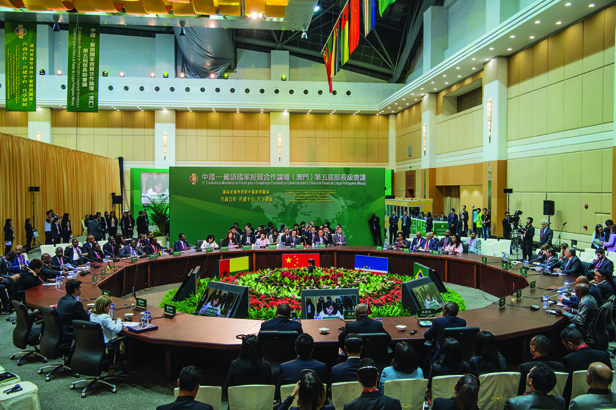
High-level government officials attended the 5th Ministerial Conference of Forum Macao
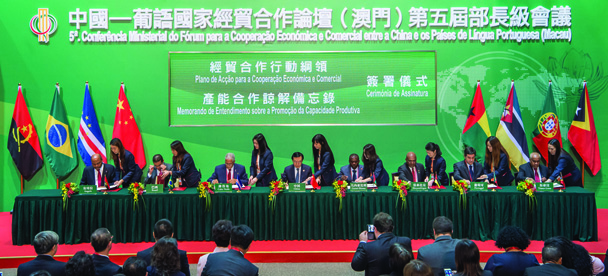
Signing ceremony of the Strategic Plan for Economic and Trade Co-operation of the 5th Ministerial Conference of Forum Macao (2017-2019)
Macao’s special advantages
During the 5th Ministerial Conference of Forum Macao, participating ministers praised Macao’s function as a Commercial and Trade Co-operation Service Platform between China and Portuguese-speaking Countries. In his opening speech, Premier Li encouraged Portuguese-speaking Countries to continue to make use of Macao’s advantages: its bilingualism in Chinese and Portuguese, its geographical location, upgraded infrastructure and attractive business environment.
Ministers responsible for economic or trade affairs from Angola, Brazil, Cape Verde, China, Guinea-Bissau, Mozambique, Portugal and East Timor acknowledged the importance of the Macao platform in the Strategic Plan for Economic and Trade Co-operation of the 5th Ministerial Conference of Forum Macao (2017-2019), approved by the government officials.
The ministers pledged to strengthen mechanisms for collaboration between governments and to promote bilateral and multilateral co-operation in areas including trade, investment, production capacity and finance.
They agreed to encourage Forum Macao members to develop their own special advantages, maintaining co-operation for development in the fields of infrastructure, health, education, and training, among others. Another goal set out in the strategic plan is to consider the possibility of establishing in Macao a Forum Macao research centre, which would make information on co-operation available to experts and academics in the participating countries.
Boosting investment
Under the heading of investment and business cooperation, the ministers agreed to study new measures to facilitate investment between their countries and create an attractive business environment, in part by taking action to find new areas of investment and models. They also pledged to support member companies in Forum Macao to build trade and economic co-operation zones in countries interested in development.
As for trade, the strategic plan states that in the present international economic context, proper measures should be taken to promote the development of trade between members of Forum Macao, and to increase the quality and level of co-operation.
Stimulating exchanges and collaboration in the areas of certification, health inspection, food safety and property rights, among others, is another goal set out in the strategic plan. The government officials agreed to study measures that could enhance customs co-operation.
Another area covered by the strategic plan is collaboration in the field of production capacity. The aim is to enhance such reciprocation between the members of Forum Macao, especially for the benefit of the socio-economic development of Portuguese-speaking Countries in Africa and Asia. The plan includes encouraging financial institutions to support such collaboration and to help develop industry in Portuguesespeaking Countries in Africa and Asia, with a view to increasing their production capacity and exports.
The strategic plan states the need to encourage companies to make joint bids for public-sector contracts, to form partnerships and to make joint investments, and to study the possibility of creating a special platform for exchanging information about co-operative projects. Macao’s role was once again highlighted, as the ministers agreed to develop the advantages – including the linguistic and cultural advantages – offered by the present ties between Macao and Forum Macao members to promote co-operation in the area of production capacity.
Infrastructure development
The governments of the participating countries pledged to enhance co-operation in the fields of agriculture, forestry, fisheries and livestock. The intentions include the promotion of further exchanges and training, and the encouragement of co-operation in research and agricultural and forestry-related technology.
The ministers agreed to create conditions to support the members of Forum Macao in Africa and Asia in the area of agricultural production, and to promote participation in agro-businesses as a way to accelerate the building and upgrading of agricultural and aquaculture infrastructure for processing and logistics.
Another chapter of the strategic plan covers co-operation in building infrastructure. The goals include the sharing of technology and lessons taught by experience, and taking action to attract member companies of Forum Macao to work in this field, especially in the areas of planning, conception, consulting, equipment and materials, technology, construction, operations and management.
The ministers agreed to encourage financial institutions to support infrastructure projects with funding and insurance coverage. They decided to give out more information on the infrastructure plans of their respective countries, and to promote business meetings on topics including railway construction and management, clean energy and project funding.
The strategic plan suggests assessment of the possibility of having companies in Forum Macao members – that are licensed to do hydraulic and harbour work – take part in endeavours related to the sea, including shipbuilding and repair.
The chapter on infrastructure stresses the importance of the Forum Macao Training Centre in improving the skills of people working for public bodies that manage infrastructure.
Support exchanges
The governments agreed to increase exchanges and try to diversify joint efforts in co-operation in energy and natural resources, encouraging companies to jointly promote mutually beneficial projects. The ministers noted that cooperation in this field could be especially important for sustaining socioeconomic development in Portuguesespeaking Countries in Africa and Asia.
Under the heading of education and human resources, the strategic plan stresses the importance of the teaching of the Chinese and Portuguese languages in the countries that are members of Forum Macao, and enhancing the continuous training of people with a view to developing trade and other economic ties. Macao’s role in the promotion of bilingual experts is also highlighted in the document.
As for financial co-operation, the ministers agreed to consider organising exchange sessions in Macao. They also suggested encouraging Mainland Chinese companies to set up capital operation centres and settlement centres for investments in Portuguese-speaking Countries.
Another chapter of the strategic plan is about co-operation in development. Mainland China promises to continue to provide loans on special terms to promote the development of those countries. The ministers also stressed the need to promote agricultural co-operation and research.
Tourism is another important area for collaboration, and the countries that are members of Forum Macao agreed to make use of the advantages of Macao as the World Centre of Tourism and Leisure and as the Commercial and Trade Cooperation Service Platform between China and Portuguesespeaking Countries. Measures to be taken to boost tourism include further exchanges and training, the establishment of new mechanisms to encourage private investment from Forum Macao members, and the encouragement of Chinese tourists to visit Portuguese-speaking Countries.
The strategic plan mentions the need to make studies of the viability of increasing direct sea and air services among members of Forum Macao, and to enhance co-operation between their airlines.
The government officials promised to strengthen cooperation in the field of health. Macao’s role as a platform in the field of health and the importance of promoting Traditional Chinese Medicine are also stressed in the strategic plan.
The document states that co-operation should be enhanced in transport and communications, culture, radio, television and cinema, sport, maritime affairs and joint endeavours by provinces and municipalities, among other fields.
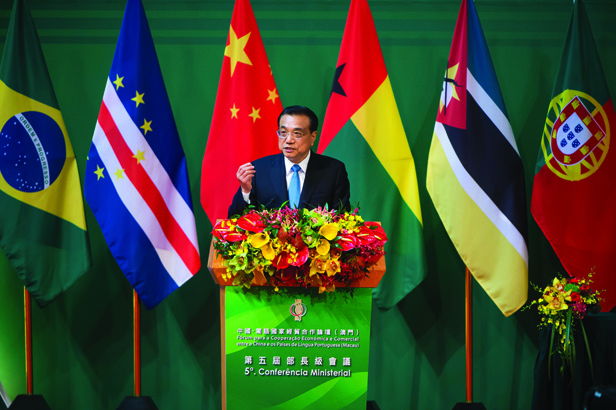
Chinese Premier Li Keqiang



